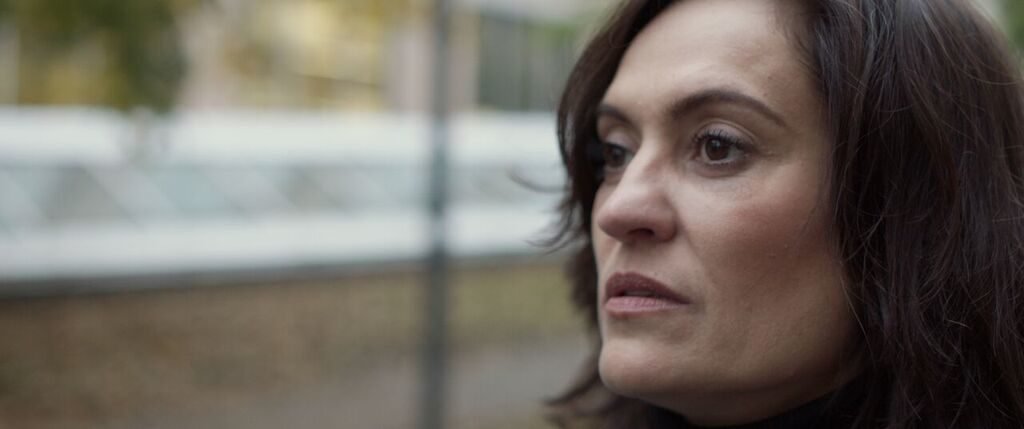Renée Beaulieu holds a degree in screenwriting from INIS (the National Institute of Image and Sound), a PhD in film studies, and is a certified pharmacist. Her previous features include “Le Ring” and “Le Garagiste.” She has written, directed, and produced several short films and written television, theater, novels, and poetry.
“The Naturally Wanton Pleasure of Skin” (“Les Salopes”) will premiere at the 2018 Toronto International Film Festival on September 7.
W&H: Describe the film for us in your own words.
RB: I wanted to make a movie presenting women in an unusual way and to tackle a poorly-understood topic. Therefore, I put a woman in a leading role, and I gave important roles to several women. My movie centers on a 45-year-old professional woman who is financially independent and emancipated. These women exist, but are rarely represented in cinema. I wanted to tackle an issue rarely seen in cinema: female sexuality.
W&H: What drew you to this story?
RB: Women in mainstream cinema are underrepresented and, when presented, are often there to support the roles of men. Women in cinema are usually beautiful but without great personality or character, because they are accessories.
Women are usually portrayed as loving, devoted, and faithful. Their sexuality is intimately, and generally exclusively, linked to the pleasure of men. Yet there are many other types of women who are never represented. We must therefore represent these other women to release them from societal constraints.
W&H: What do you want people to think about when they are leaving the theater?
RB: I hope this makes audiences think about the values of our modern societies, especially regarding relationships and gender stereotypes.
W&H: What was the biggest challenge in making the film?
RB: The biggest challenge was shooting scenes of sexuality. Filming sexuality necessarily means speaking of my own intimacy in a setting that is no longer intimate. While filming, my own intimacy met in a certain way the intimacy of actors and actresses as well as the photo director and soundman. It was necessary to open up to this exercise with detachment and commitment. It was a demanding experience, which required me to confront my inhibitions and to overcome them. It was exhilarating!
W&H: How did you get your film funded? Share some insights into how you got the film made.
RB: The film has been rejected many times by funders for a variety of reasons, including the topic and the positions I took, as well as the controversial choices I was proposing. But I received a small amount from Telefilm Canada, which allowed me to get my film into production. Also, by taking on several positions — scriptwriter, director, producer, editor — I was able to reinvest my wages. Then the distributor, Film Option International, believed in the film and advanced a guaranteed minimum that allowed me to complete the budget with Canadian and Quebec tax credits. Not to mention that the entire team and the actors were paid a half salary.
I have experience with managing small budgets; I made my first feature film with $65,000 cash and it was still played around the world.
W&H: What inspired you to become a filmmaker?
RB: Time and intensity. At a very young age I had a keen awareness of the passing of time and the mysteries of human experience. I was emotionally hypersensitive. With this baggage — if not this burden — writing and subsequently working in cinema became a way of life that allows me to search for answers to the mysteries of life, to manage my emotions, and to better understand them by putting them on the stage and finally taking the time to deal with them. Indeed, a film is a still image and a human experience. It lingers with intensity for 90 minutes, and offers a way to stretch the time — to extend, improve, and explore.
W&H: What’s the best and worst advice you’ve received?
RB: A long time ago, an established TV writer told me that what I was writing was not what we are supposed to do. He told me I could work as a researcher if I wanted to stay in the movie or television industry, but not as an author or filmmaker. He was very confident about his assessment and it hit me. I was also very confident that he was wrong about be. Fortunately, I’m very stubborn and rather than deter me, this experience motivated me.
That was the worst advice! The best advice came from a friend: “Determine exactly what you want, no matter what it is, and do what it takes to get it.”
W&H: What advice do you have for other female directors?
RB: Take the space you want; do not wait to be asked. Just take it and do your best.
W&H: Name your favorite woman-directed film and why.
RB: “My King” (“Mon Roi”) by Maïwenn, but I have a lot of admiration for Kathryn Bigelow because she takes space and shines in one of the most closed boys’ clubs.
W&H: Hollywood and the global film industry are in the midst of undergoing a major transformation. What differences have you noticed since the #MeToo and #TimesUp movements launched?
RB: As the #MeToo movement was taking off, I had lots of discussions with my family, friends, and colleagues regarding sexuality and power dynamics. I was under the impression that everyone was trying to define their core values. Several months later, I do not see much in the way of concrete changes, but I think that the movement has impacted the attitude of men and women regarding equality and the emancipation of women.







